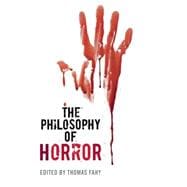
The Philosophy of Horror
by Fahy, Thomas-

This Item Qualifies for Free Shipping!*
*Excludes marketplace orders.
Buy New
Rent Textbook
Rent Digital
Used Textbook
We're Sorry
Sold Out
How Marketplace Works:
- This item is offered by an independent seller and not shipped from our warehouse
- Item details like edition and cover design may differ from our description; see seller's comments before ordering.
- Sellers much confirm and ship within two business days; otherwise, the order will be cancelled and refunded.
- Marketplace purchases cannot be returned to eCampus.com. Contact the seller directly for inquiries; if no response within two days, contact customer service.
- Additional shipping costs apply to Marketplace purchases. Review shipping costs at checkout.
Summary
Table of Contents
| Acknowledgments | p. vii |
| Introduction | p. 1 |
| Horror and the Idea of Everyday Life: On Skeptical Threats in Psycho and The Birds | p. 14 |
| Through a Mirror, Darkly: Art-Horror as a Medium for Moral Reflection | p. 33 |
| The Justification of Torture-Horror: Retribution and Sadism in Saw, Hostel, and The Devil's Rejects | p. 42 |
| Hobbes, Human Nature, and the Culture of American Violence in Truman Capote's In Cold Blood | p. 57 |
| Making Their Presence Known: TV's Ghost-Hunter Phenomenon in a "Post-" World | p. 72 |
| The Vampire with a Soul: Angel and the Quest for Identity | p. 86 |
| Ideological Formations of the Nuclear Family in The Hills Have Eyes | p. 102 |
| Zombies of the World, Unite: Class Struggle and Alienation in Land of the Dead | p. 121 |
| The Fall of the House of Ulmer: Europe vs. America in the Gothic Vision of The Black Cat | p. 137 |
| From Domestic Nightmares to the Nightmare of History: Uncanny Eruptions of Violence in King's and Kubrick's Versions of The Shining | p. 161 |
| "Hot with Rapture and Cold with Fear": Grotesque, Sublime, and Postmodern Transformations in Patrick Süskind's Perfume | p. 179 |
| Shock Value: A Deleuzean Encounter with James Purdy's Narrow Rooms | p. 199 |
| Making Monsters: The Philosophy of Reproduction in Mary Shelley's Frankenstein and the Universal Films Frankenstein and The Bride of Frankenstein | p. 212 |
| Kitsch and Camp and Things That Go Bump in the Night; or, Sontag and Adorno at the (Horror) Movies | p. 229 |
| Contributors | p. 245 |
| Index | p. 249 |
| Table of Contents provided by Ingram. All Rights Reserved. |
An electronic version of this book is available through VitalSource.
This book is viewable on PC, Mac, iPhone, iPad, iPod Touch, and most smartphones.
By purchasing, you will be able to view this book online, as well as download it, for the chosen number of days.
Digital License
You are licensing a digital product for a set duration. Durations are set forth in the product description, with "Lifetime" typically meaning five (5) years of online access and permanent download to a supported device. All licenses are non-transferable.
More details can be found here.
A downloadable version of this book is available through the eCampus Reader or compatible Adobe readers.
Applications are available on iOS, Android, PC, Mac, and Windows Mobile platforms.
Please view the compatibility matrix prior to purchase.